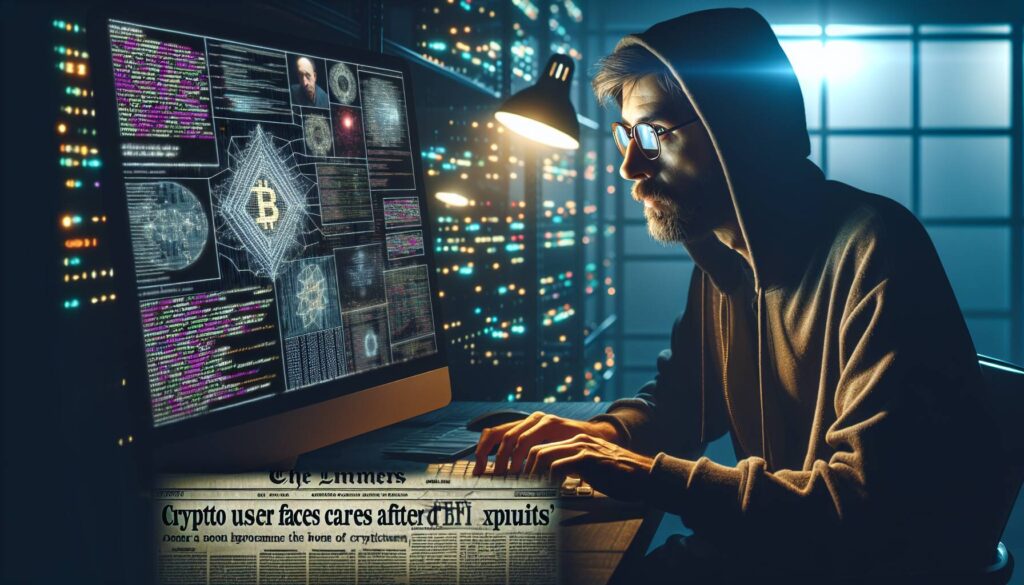In a surprising turn of events in the cryptocurrency landscape, U.S. prosecutors have charged Andean “Andy” Medjedovic, a 22-year-old Canadian, with stealing a staggering million through two notable decentralized finance (DeFi) hacks. The allegation follows two high-profile exploits: the 2021 Indexed Finance incident, where Medjedovic allegedly siphoned off million, and a more recent raid on KyberSwap in 2023, which cost the platform approximately million.
The case is unfolding in the Eastern District of New York (EDNY), where prosecutors have unveiled an indictment that casts Medjedovic as the central figure behind these cybercrimes. While his involvement in the KyberSwap hack was previously undisclosed, he openly acknowledged his role in the Indexed Finance breach. Medjedovic appeared to justify his actions at the time, expressing a belief that he wasn’t committing any wrongdoing—a sentiment echoed by other DeFi hackers, including Avraham “Avi” Eisenberg, who faced similar legal repercussions for his exploits.
Medjedovic has been on the run since December 2021, when a Canadian court issued an arrest warrant for him.
Reports indicate that Medjedovic has been evading authorities, claiming an exhausting existence as a fugitive while traveling through various regions of Europe, South America, and even an undisclosed island. Despite his attempts to redefine himself as a whitehat hacker—a term used to describe ethical hackers—he continued to engage in activities that caught the attention of law enforcement.
According to prosecutors, Medjedovic meticulously planned the KyberSwap attack for several months, even creating a “POST-EXPLOITATION” strategy that highlighted his reflections on past mistakes and the risks of capture. As the investigation unfolds, it remains to be seen how this case will influence the ongoing discussions about the legalities and ethics surrounding decentralized finance operations.

Major Developments in DeFi Hacks and Legal Ramifications
The recent indictment of Andean “Andy” Medjedovic highlights significant issues surrounding decentralized finance (DeFi) hacking and its evolving legal landscape. Below are key points regarding these developments:
- Identity of the Hacker:
- Andean “Andy” Medjedovic, a 22-year-old Canadian, is accused of stealing a total of million through two major DeFi hacks.
- His alleged role in the 2023 KyberSwap hack was previously unknown, but he openly admitted to attacking Indexed Finance when he was a teenager.
- Legal Consequences:
- Medjedovic has been charged in the Eastern District of New York and is currently a fugitive, wanted since December 2021.
- His situation echoes the recent conviction of Avraham “Avi” Eisenberg, who faces up to 20 years in prison for his actions in the 2022 Mango Markets hack.
- Philosophy of DeFi Hackers:
- Medjedovic, like Eisenberg, has claimed that his actions were not illegal, arguing a stance reminiscent of the “code is law” philosophy prevalent in the DeFi community.
- This mindset raises critical questions about ethics and legality in blockchain systems and could shape future legislation and enforcement.
- Implications for Users and Investors:
- As DeFi continues to grow, the security of these platforms remains a pressing concern for investors, who must be aware of the risks associated with hacking incidents.
- The evolving legal consequences for perpetrators may deter future acts of fraud, impacting how future DeFi protocols are developed and secured.
- Living As a Fugitive:
- Medjedovic described his life on the run as “exhausting,” which highlights the personal toll of evading law enforcement and the consequences of criminal behavior.
- His experience may serve as a cautionary tale for those considering engaging in illicit activities within the cryptocurrency space.
Future legal precedents set by cases like those involving Medjedovic and Eisenberg may shape the regulatory landscape of cryptocurrency and DeFi, affecting not only hackers but also legitimate users and developers in the sector.
DeFi Drama: The Rise and Fall of Crypto Hackers
The world of decentralized finance (DeFi) is no stranger to hacking incidents, but the recent charges against 22-year-old Andean “Andy” Medjedovic add a new twist to this ongoing saga. Previously known for the 2021 Indexed Finance exploit, Medjedovic’s alleged involvement in the heist of million from KyberSwap has caught the attention of regulators and crypto enthusiasts alike. This case mirrors other high-profile hacking events in the DeFi space, such as Avraham “Avi” Eisenberg’s Mango Markets exploit, which siphoned off a staggering 0 million.
One of the competitive advantages that Medjedovic seems to have had is his audacity. Unlike many who discreetly operate in shadows, he openly discussed his exploits, believing they fell under the mantra of “code is law.” This head-in-the-sand mentality may resonate with some in the crypto community who view such hacks as a form of economic freedom or a challenge against traditional finance. However, this perception could be detrimental to the broader DeFi ecosystem, which is striving to establish robust legal frameworks and instill trust among users.
On the flip side, Medjedovic’s approach may serve as a stark warning for other potential hackers. With recent legal precedents like Eisenberg’s conviction for fraud and market manipulation, it’s clear that courts are not lenient when it comes to hacking in the crypto space. The fact that prosecutors have pursued Medjedovic aggressively highlights the increasing seriousness with which authorities are treating these high-stakes cybercrimes. For aspiring hackers, this creates an environment rife with danger and uncertainty, suggesting that what was once viewed as a high-reward risk might now be seen as a slippery slope toward imprisonment.
This narrative holds significant implications not just for the alleged hacker but also for investors and those involved in the DeFi space. On one hand, it might instill a sense of caution among potential investors fearing regulatory crackdowns and the volatility that hackers introduce. On the other hand, it could also galvanize community efforts to bolster security measures and enhance protocol integrity, ultimately benefiting legitimate players within the DeFi ecosystem. Furthermore, users who view themselves as ‘whitehat’ hackers might feel emboldened to expose vulnerabilities, underlining a growing cultural battle within the crypto space.
In essence, while the drama surrounding Medjedovic adds yet another chapter to the ever-evolving narrative of DeFi security risks, it also poses complex challenges—both operational and ethical—for investors, security analysts, and regulators alike. Whether this case fosters an environment of improved security or stifles innovation through fear remains to be seen.

















